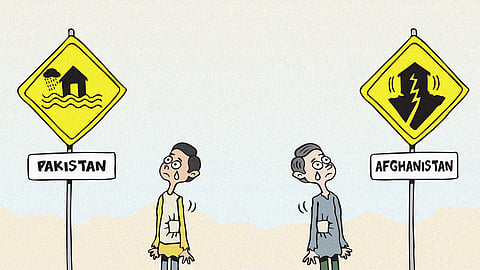Pakistan's battles over federalism – Southasia Weekly #82
This week in Himal
This week, Salman Rafi Sheikh looks at recent discussions on amending Pakistan’s National Finance Commission award, which has revived fears that Pakistan’s provinces will lose out due to fiscal recentralisation.
Also out this week, Srikar Ragavan revisits the political and intellectual life of Kannada scholar M M Kalburgi, ten years after his assassination by Hindu nationalists - don’t miss it!
For the upcoming episode of the Southasia Review of Books podcast, host Shwetha Srikanthan speaks to British-Bangladeshi writer Saima Begum on her debut novel “The First Jasmines”, which follows the stories of two sisters captured and imprisoned by the Pakistani military in the final weeks of the Bangladesh Liberation War in 1971.
You have three more days to sign up to watch Burma Storybook, directed by Petr Lom, our September screening of Screen Southasia in collaboration with Film Southasia. Sign up to watch it here.
This week in Southasia
A string of natural disasters leaves Afghanistan, Pakistan and northern India reeling
Southasia grappled with natural disasters this week. In Afghanistan, an earthquake of 6.0 magnitude struck the mountainous Kunar province in the east, killing over 2200 people according to the Taliban administration, with strong and repeated aftershocks recorded. Survivors from Kunar province say there are deaths in every home, with entire livelihoods lost and villages flattened. Across north India and Pakistan’s Punjab province, more than two million people have been impacted by what is already being described as the ‘biggest flood in history’ after all three major rivers in Punjab overflowed simultaneously. More than 2000 villages have been inundated, with many families losing their entire crop and their homes.
For both countries, natural disasters have compounded existing vulnerabilities, in the broader context of political instability and fragile governance structures. Some of those impacted by the earthquake in Afghanistan were recently deported from Pakistan, sparking calls from the UN to halt the process, sparked by tensions over crossborder militancy. Funding cuts to Afghanistan after the Taliban takeover in 2021 have also impacted humanitarian response. Reports have also emerged that rescuers have prioritised men and children for medical treatment over women due to gender discrimination.
While Pakistan’s economy has been showing signs of stabilisation, analysts warn that inflation is expected to spike after the floods. India used diplomatic channels to warn Pakistan about flooding, rather than through the Indus Water Treaty which remains suspended after the Pahalgam attacks, but Pakistan has accused India of deliberate flooding by deliberately releasing excess water from its dams without timely warnings, though water experts have said there is no evidence of this - rather, experts have pointed to climate change as the key factor for heavier rainfall.
For broader context, our interview with Najibullah Sadid in the wake of the 2023 earthquake in Herat is important to revisit, as is our article from Daanish Mustafa from May 2025 in the wake of the suspension of the Indus Water Treaty.
From the archive

